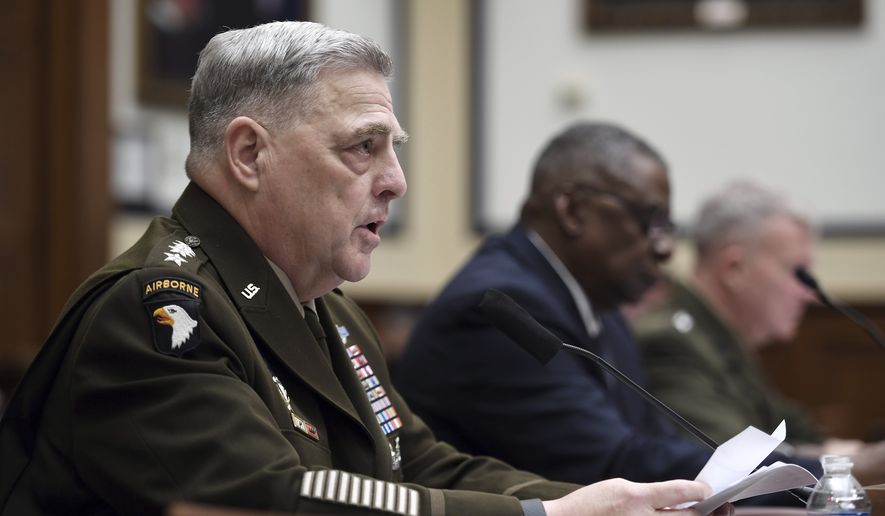By Ben Wolfgang and Joseph Clark
September 29, 2021
-The Washington Times
The Pentagon’s top leadership returned to Capitol Hill Wednesday for a second consecutive day of hearings before Congress on the chaotic withdrawal from Afghanistan following more than six hours of grueling testimony on Tuesday.
Republicans on the House Armed Services Committee continued to press top brass — Defense Secretary Lloyd Austin, Joint Chiefs of Staff Chairman Gen. Mark A. Milley, and head of U.S. Central Command Gen. Kenneth F. McKenzie — on key revelations from Tuesday’s testimony before the Senate.
Alabama Rep. Mike Rogers, the top Republican on the committee, said Tuesday’s testimony from the Defense Department leaders directly contradicted President Biden’s assertions that the withdrawal was an “extraordinary success.”
“This characterization is either purposefully misleading or proof that President Biden is out of touch with what was actually happening. As we heard today in the Senate, this withdrawal wasn’t an extraordinary success; it was an extraordinary disaster.
“It will go down in history as one of the greatest failures of American leadership,” the congressman said.
Most notably, top military leaders on Tuesday raised glaring concerns among Republicans by confirming they advised the White House to keep at least 2,500 troops in Afghanistan and to reject an arbitrary timeline for withdrawal. Their statements seemingly contradict Mr. Biden who said the Pentagon brass was on board with his Aug. 31 exit date regardless of conditions on the ground and amid warning signs of a likely Taliban takeover.
The admissions from Gen. Milley and Gen. McKenzie were among the biggest revelations from Tuesday’s heated hearing before the Senate Armed Services Committee, the first such hearing with Defense Department leadership since Afghanistan fell to the Taliban on Aug. 15. Mr. Austin also appeared before the panel.
Though hesitant to publicly contradict the president and stressing that they wouldn’t divulge the details of private conversations, Gens. Milley and McKenzie seemed to refute several points made by Mr. Biden and his top aides over the past six weeks. Both officers stated flatly that al Qaeda remains present in Afghanistan, clashing with the president’s late August claim that the terrorist group was “gone” from the country.
The testimony prompted a quick response from the White House. White House press secretary Jen Psaki told reporters that the Republican lawmakers’ read of the testimony took Mr. Biden’s August remarks out of context and said “there was a wide range of viewpoints” offered by the president’s national security team.
Still, Republicans remained concerned.
“Today’s hearing confirmed much of what I suspected: President Biden ignored the advice of his top military leaders, including his commanders on the ground – and then lied to the American people about it,” said Sen. James M. Inhofe of Oklahoma, the top Republican on the Senate Armed Services Committee, on Tuesday.
“Our service members, starting at the top, did everything right within the circumstances they were given by their commander-in-chief,” he said. “The failures belong solely to President Biden — that’s why he hasn’t been honest with the American people.”
Mr. Rogers has also put the leaders on notice to provide more detail on the lauded over-the-horizon counter-terrorism strategy to address threats emanating from Afghanistan going forward, which he said is a “farce” given the lack of intelligence gathering capabilities on the ground in Afghanistan.
Lawmakers have raised concerns about the strategy for weeks following the withdrawal, and some raised questions over the strategy during Tuesday’s hearing.
Sen. Elizabeth Warren, Massachusetts Democrat, said she came away from Tuesday’s hearing with a degree of comfort for the strategy.
“We always have concerns about the success of any military operation and potential for civilian casualties,” she said. “The generals and the secretary have explained that the United States has an extraordinary capacity to conduct such operations from over the horizon and a firm commitment to reduce the risk of civilian casualties.”
“Obviously, that hasn’t always worked, but they certainly explained what they believe they are comfortable with,” she said.
Others were far less convinced and said many questions remain.
“I’m not real convinced, as we speak, that over-the-horizon is going to be a good technique for us,” said Sen. Tommy Tuberville, Alabama Republican, after Tuesday’s hearing.
Sen. Josh Hawley, Missouri Republican, echoed Mr. Tuberville’s sentiment and questioned whether the administration had fully thought out the strategy.
“I think we do need to know a lot more,” he said. “I don’t think there is a plan right now, honestly.”
“We need to get answers on that,” he said.




